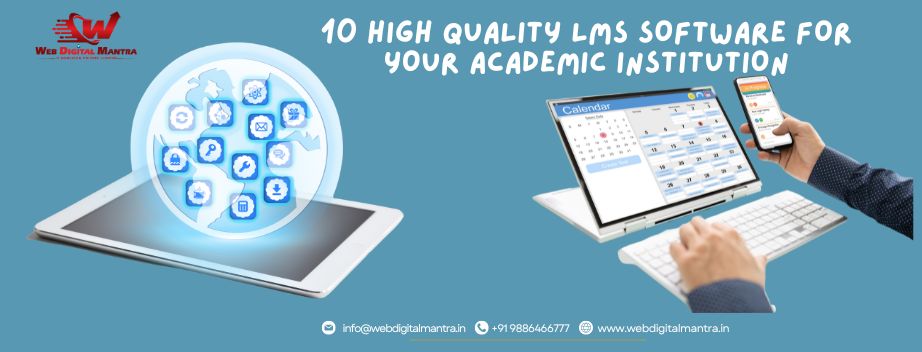
In today's digital age, the landscape of education is rapidly evolving. As educational institutions strive to provide more engaging, flexible, and personalized learning experiences, Learning Management Systems (LMS) have become essential tools. An LMS is a software application that helps manage, deliver, and track educational courses and training programs. Whether you're running a school, college, university, or corporate training program, the right LMS can make a significant difference in the effectiveness of your educational offerings. In this article, we’ll explore 10 high-quality LMS software options that are ideal for academic institutions.
A Learning Management System (LMS) is a platform designed to facilitate the administration, documentation, tracking, reporting, and delivery of educational courses, training programs, or learning and development programs. An LMS can be used by educational institutions to enhance traditional teaching methods, offer distance learning, and manage all aspects of online education. It’s also used by businesses to train employees and manage continuing education programs.
Implementing an LMS offers several benefits, including:
Centralized Learning: An LMS centralizes educational content and resources, making it easier for students and instructors to access and manage learning materials.
Enhanced Engagement: Features like interactive quizzes, discussion forums, and multimedia content can enhance student engagement and make learning more interactive.
Scalability: Whether you're managing a small class or a large institution, an LMS can scale to accommodate varying numbers of users and courses.
Tracking and Reporting: An LMS allows educators to track student progress, performance, and completion rates, providing valuable insights into the effectiveness of courses and programs.
Flexibility: With an LMS, students can access courses from anywhere at any time, providing flexibility for distance learning and accommodating different learning paces.
Here’s a list of 10 high-quality LMS software options that cater to the diverse needs of academic institutions:
1. Moodle
Moodle is one of the most popular open-source LMS platforms used by educational institutions worldwide. It is highly customizable, allowing institutions to tailor the platform to their specific needs. Moodle supports a wide range of integrations, including plugins for video conferencing, content authoring, and student management systems. It's ideal for universities and colleges looking for a flexible and robust LMS.
2. Blackboard
Blackboard is a leading commercial LMS that offers a comprehensive suite of learning tools designed to meet the needs of large institutions and K-12 schools. Its features include course management, a virtual learning environment, and robust analytics. Blackboard’s mobile-friendly interface ensures that students and instructors can access the platform from any device, enhancing the learning experience.
3. Canvas
Canvas by Instructure is a cloud-based LMS known for its user-friendly interface and strong collaboration tools. It’s widely used in higher education and K-12 institutions. Canvas offers a variety of features including multimedia support, a mobile app, and integration with other educational tools. Its intuitive design makes it easy for both educators and students to navigate and use effectively.
4. Google Classroom
Google Classroom is a free LMS that integrates seamlessly with Google Apps for Education. It’s particularly popular among K-12 schools and smaller educational institutions due to its simplicity and ease of use. Google Classroom enables educators to create, distribute, and grade assignments in a paperless environment. It’sa great choice for institutions already using Google’s suite of tools.
5. TalentLMS
TalentLMS is a freemium LMS designed for corporate training and online courses. It’s easy to use and offers features like gamification, e-commerce capabilities, and extensive customization options. TalentLMS is ideal for institutions looking to offer specialized training programs or online courses, as it provides a seamless learning experience with powerful reporting tools.
6. Schoology
Schoology is an LMS that offers a social media-like interface, making it familiar and easy to use for both students and educators. It’s designed for K-12 schools and higher education, offering features like integrated assessment tools, analytics, and a wide range of third-party integrations. Schoology’s collaborative tools make it a strong choice for institutions looking to enhance student engagement.
7. D2L Brightspace
D2L Brightspace is a commercial LMS known for its personalized learning paths and robust analytics. It’s widely used by universities and for corporate training programs. Brightspace offers powerful content creation tools and a flexible, intuitive interface that can be customized to meet the needs of diverse learning environments. Its focus on personalized learning makes it ideal for institutions aiming to tailor education to individual student needs.
8. Edmodo
Edmodo is a freemium LMS designed for K-12 schools, providing a safe and controlled environment for students. It offers easy communication between teachers, students, and parents, and integrates with a variety of educational tools. Edmodo’s user-friendly platform is ideal for younger students and institutions looking to foster a collaborative learning environment.
9. Absorb LMS
Absorb LMS is a commercial learning management system designed for corporate training and large educational institutions. It offers highly customizable features, strong reporting and analytics, and mobile learning capabilities. Absorb LMS is ideal for institutions that require a robust platform to manage large-scale training programs and track learner progress in detail.
10. LearnDash
LearnDash is a commercial LMS plugin for WordPress, making it an excellent choice for online course creators and institutions that use WordPress as their content management system. It supports various media types, offers detailed analytics and reporting, and integrates seamlessly with other WordPress plugins and tools. LearnDash is perfect for institutions looking to deliver online courses with a high level of customization.
Selecting the right LMS for your academic institution depends on several factors, including the size of your institution, the type of courses you offer, your budget, and your specific needs. Here are a few considerations to keep in mind:
Ease of Use: The LMS should be user-friendly, allowing both educators and students to navigate the platform easily.
Customization: Look for an LMS that offers customization options to tailor the platform to your institution’s branding and educational requirements.
Scalability: Ensure that the LMS can grow with your institution, accommodating an increasing number of students, courses, and educators.
Integration: The LMS should integrate with other tools and systems you’re using, such as student information systems (SIS), content authoring tools, and video conferencing platforms.
Support and Training: Choose an LMS that offers comprehensive support and training to help your institution make the most of the platform.
The Future of Learning with LMS
As educational institutions continue to embrace digital learning, the importance of a high-quality LMS cannot be overstated. Whether you're managing a small K-12 school or a large university, the right LMS can transform the way you deliver education, making it more accessible, engaging, and effective. Web Digital Mantra offers expert guidance in selecting and implementing the best LMS for your institution, ensuring that your transition to digital learning is smooth and successful. By choosing a top-notch LMS, you’re not just investing in software; you’re investing in the future of your students and your institution.
1. What is an LMS and how does it benefit an academic institution?
An LMS (Learning Management System) is a software platform that helps manage, deliver, and track educational courses and training programs. It benefits academic institutions by providing centralized learning, enhancing student engagement, offering scalability, and enabling detailed tracking and reporting of student progress.
2. Can an LMS be used for both K-12 and higher education institutions?
Yes, an LMS can be used across different educational levels, from K-12 to higher education institutions. Many LMS platforms offer customizable features that cater to the unique needs of various educational settings.
3. How do I choose the right LMS for my institution?
Choosing the right LMS depends on factors like ease of use, customization options, scalability, integration with existing tools, and the level of support and training provided. Assess your institution's specific needs and budget to make an informed decision.
4. What are the main differences between free and paid LMS platforms?
Free LMS platforms typically offer basic features and limited customization, making them suitable for smaller institutions or those with budget constraints. Paid LMS platforms provide advanced features, more customization, better support, and scalability, making them ideal for larger institutions or those with specific needs.
5. Can Web Digital Mantra help with LMS implementation?
Yes, Web Digital Mantra offers expert guidance and support in selecting and implementing the best LMS for your academic institution, ensuring a smooth transition to digital learning.
 Ganesh B R
Ganesh B R

The insights on quality LMS software for schools are helpful They explain how to boost learning and engagement.

The insights on quality LMS software for schools are helpful They explain how to boost learning and engagement.
Copyright @2020. All Rights Reserved by WEB DIGITAL MANTRA IT SERVICES PVT LTD
Post Reviews